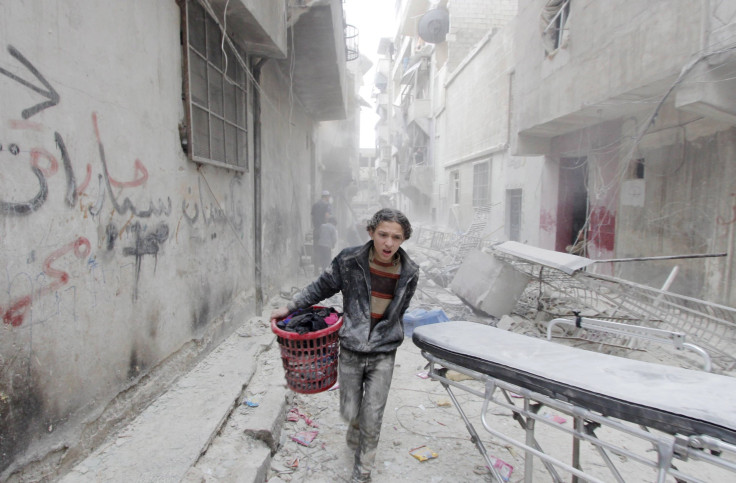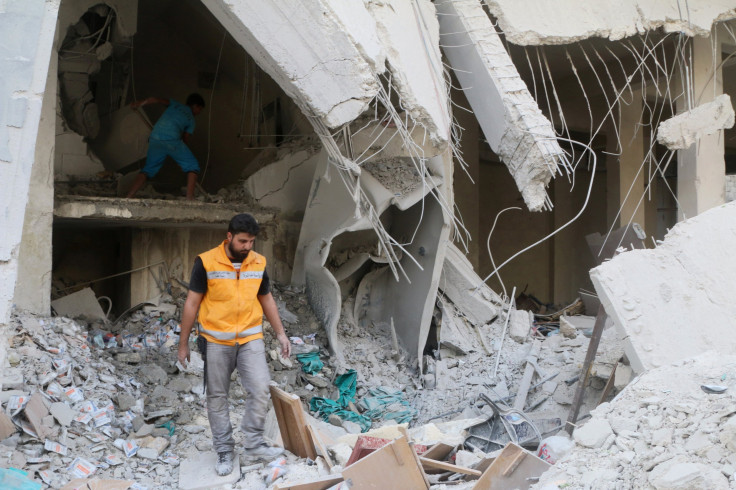Jihadists Mobilize In Syria As Peacemaking Unravels

Jihadi militants in Syria including al Qaeda are mobilizing again for all-out war on President Bashar Assad, taking advantage of the collapse of peace talks to eclipse nationalist rival insurgents that signed on to a faltering truce.
Al Qaeda’s Syrian branch, the Nusra Front, was excluded from a ceasefire put in place in February and from peace talks that followed. The talks broke up last month, with Assad’s government and foes blaming each other for military escalation.
After lying low in the early days of the truce, Nusra has re-emerged on the battlefield as the diplomacy has unraveled, spearheading recent attacks on pro-government Iranian militias near Aleppo, Nusra commanders and other rebels say.
In the latest expansion of its profile, it and other groups have revived the Jaish al-Fatah, or Army of Conquest, a military alliance of disparate Islamist rebel groups that won big victories against government forces last year.
Nusra’s resurgence could undermine the Western-backed rebel groups that signed up to the truce and attended the peace talks, giving Assad’s government and its Russian and Iranian backers more reasons to press on with a war during which they have hit insurgents of all stripes.
“Jaish al-Fatah has returned, but this time in strength, and our goal is to spread to the major fronts in Syria,” Abu Shaimaa, a Nusra Front commander, said while speaking to Reuters from rebel-held Idlib province about the revival of the Islamist rebel alliance.
“We ask God that with Jaish al-Fatah’s return, the victories will also return,” added Zaher Abu Hassan, head of a Jaish al-Fatah media organization in Idlib.
The Islamist rebels still face the challenge of overcoming their own rivalries. One senior insurgent source said that while Jaish al-Fatah had made a comeback in one area, talks were still under way to relaunch the alliance more widely. “In southern Aleppo, yes, there is an operations room, but the goal is [to repeat it] on all the active fronts,” he said.
Recruitment Drive
The insurgency against Assad is a patchwork of factions ranging from groups linked to al Qaeda or inspired by it to those with a nationalist agenda that fight under the banner of the Free Syrian Army (FSA). Some of these groups have received military aid from the U.S., Turkey, and Saudi Arabia.
The Islamic State group, which broke away from al Qaeda, is in conflict with both other insurgent groups and Damascus as it fights for its self-declared caliphate in Syria and Iraq. It has lost territory in recent months but still controls much of eastern and northern Syria.
Last year, the Islamist rebel factions that formed Jaish al-Fatah put aside rivalries to drive the Syrian government out of Idlib province before thrusting into the areas near the coastal mountains that form the heartland of Assad’s Alawite sect. That advance helped prompt Russia’s decision to send its air force to bomb on behalf of Assad, tipping the war his way with the help of Iranian reinforcements on the ground.
Rebel sources gave differing accounts on how far the groups in Jaish al-Fatah had gone toward reviving the alliance, particularly on the extent of the involvement of Ahrar al-Sham, a powerful group widely believed to be backed by Turkey.
Ahrar al-Sham, an important component of the alliance last year, had backed the political track but has steadily distanced itself from United Nations-led diplomacy that failed to secure a full halt to airstrikes, adequate aid deliveries or a prisoner release.
Ahrar al-Sham and the Nusra Front, both powerful in northwestern Syria, joined forces in an attack that resulted in the capture of a government-held Alawite town in Hama province May 13, although they were not operating under the Jaish al-Fatah banner.
The May 6 capture of another town, Khan Touman, south of Aleppo, from pro-government Shiite militias including Iranians was openly attributed to Jaish al-Fatah, with rebels identifying Nusra and another group, Jund al-Aqsa, as the leading forces.
Insurgent sources said the Nusra Front and its allies had deployed to southern Aleppo from nearby Idlib, one of their strongholds, to stave off attempted government advances that threatened to splinter rebel-held areas in two.
Meanwhile, hardline Sunni Islamist Sheikh Abdullah al-Mohaisany, a Saudi national, has been on a new recruitment drive in Idlib. At one rally, captured in a video posted on YouTube, he urges all males over the age of 15 to join the jihad.
A resident of the area where the rally was held said about 300 youths had volunteered that day, and they would be funneled into Jaish al-Fatah factions.
Al Qaeda leader Ayman al-Zawahri has also weighed in on Syria in a voice message, lambasting the political process and urging jihadis to unite. His remarks were interpreted as a directive for the group to focus more of its attention on Syria.

‘A Dangerous Indicator’
FSA groups that played prominent roles in the diplomatic process launched this year with American and Russian blessings say they still have the upper hand over Nusra in important areas, notably the city of Aleppo itself, and areas of southern Syria near the border with Jordan.
FSA groups have been battling the Islamic State group at the Turkish border in recent weeks, while also fending off three government offensives just north of Aleppo, said Zakaria Malahefji, the politburo chief of one such group, Fastaqim.
They say they will not return to peace talks until the situation improves on the ground. Reflecting the dim prospects for diplomacy, no date for talks emerged from an international meeting Tuesday.
Another FSA commander said the prominent role played by the Nusra Front in recent battles was “a dangerous indicator” of where the war was headed in the event diplomacy failed completely. The commander, a senior opposition official speaking on condition of anonymity, said Nusra had seized the moment to demonstrate its value to the insurgency and the futility of diplomacy.
“There is talk about the restructuring of Jaish al-Fatah, particularly after the victory in Khan Touman,” he said. “The lack of a political horizon and aid, or anything that brings relief to the people, raises the chances of the formation of Jaish al-Fatah and the alliance with Nusra.”
Noah Bonsey, a senior analyst with International Crisis Group, said the re-emergence of Jaish al-Fatah was an indicator of the political climate in the opposition and its realization that the cessation of hostilities was unsustainable. The resumption of fighting was good for Nusra, he said, adding, “This is giving them credibility, whereas the cessation appeared to be diminishing their credibility and highlighting real rifts between Nusra and the rest of the rebellion.”
Much of the opposition believed “that the regime and the Iran-backed militias were able to benefit from it, and that they need to join Nusra in reasserting offensive pressure,” he said.
© Copyright Thomson Reuters 2024. All rights reserved.





















